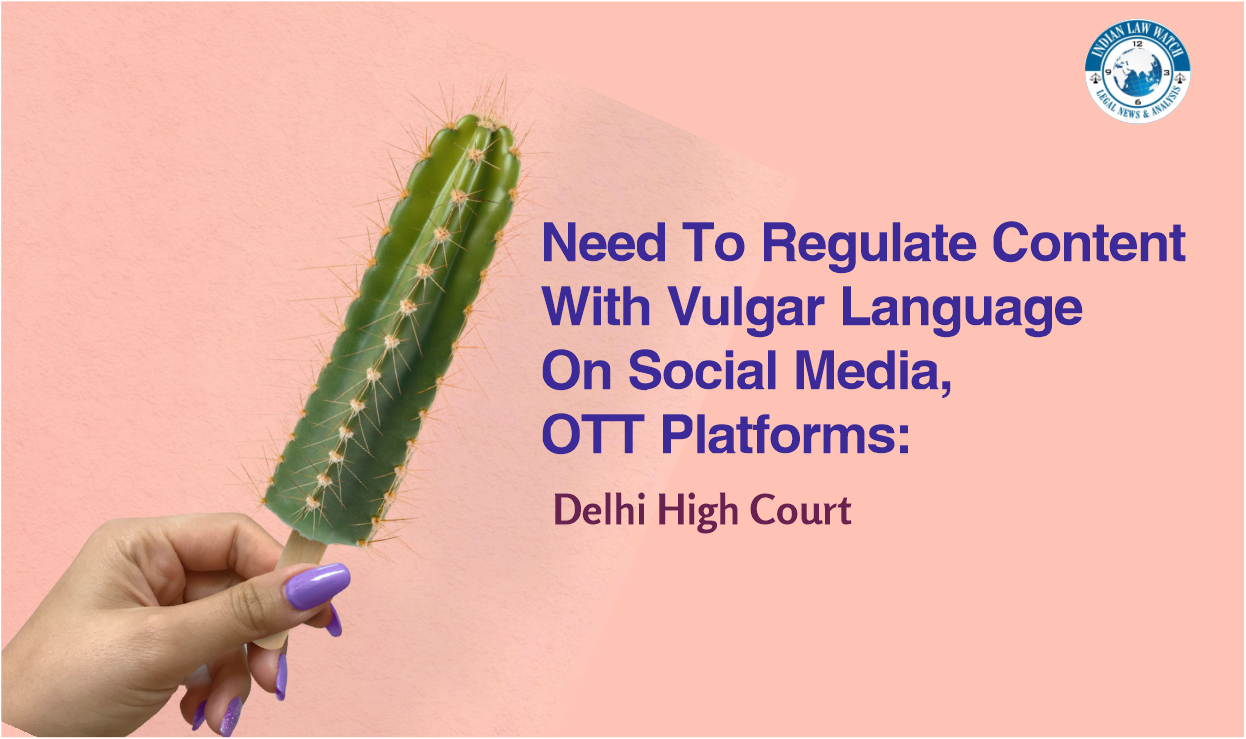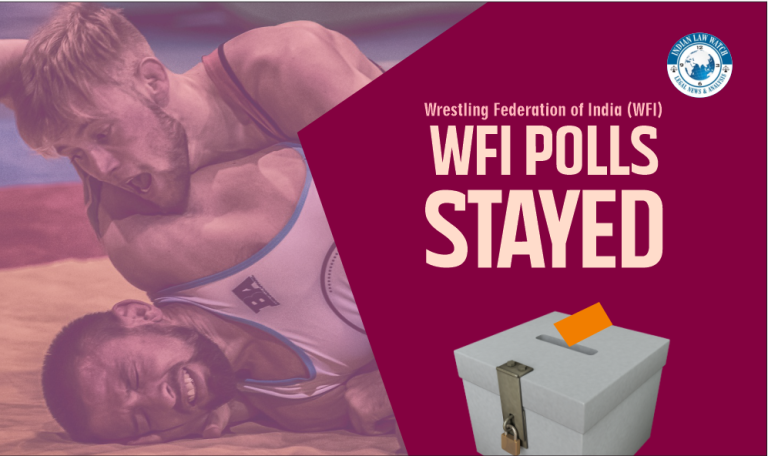

While mincing just no words in observing the use of vulgar language in public domain and on social media platforms needs to be taken seriously as they are open to children of tender age, the Delhi High Court in a most laudable, landmark and latest judgment titled TVF Media Labs Pvt Ltd & Ors vs State Govt of NCT of Delhi & Anr. in CRL.M.C. 2214/2020 & connected matters in Neutral Citation No. 2023/DHC/001676 has said unequivocally that the issue of enactment of appropriate law or guidelines to regulate content on social media and OTT platforms needs urgent attention. It must be noted that Hon’ble Ms Justice Swarana Kanta Sharma was particularly very critical of the language used in TVF web series “College Romance” observing that it does not pass “morale decency community test” of a common man and transgresses into the area of obscenity. The court said that the use of obscene words and foul language on social media platforms have to be regulated “when it crosses a particular line” as it can be a “true threat” to impressionable minds and cannot receive constitutional protection of free speech.

- It is the alleged that the said web series contains vulgar and obscene material and depicts women in indecent form in violation of the provisions of Sections 292/294 of Indian Penal Code (‘IPC’), 1860, Section 67/67A of Information and Technology Act, 2000 (‘IT Act’) and Sections 2 (c), 3 and 4 of Indecent Representation of Women Prohibition Act, 1986. The petitioner is also the owner-cum-manager of popular YouTube channel known as ‘Timeliners’, on which indecent content had been broadcasted and published for consumption by general public without any warning to the effect that the content is for adult consumption only.”
- This Court also wanted to test/examine the test of a common prudent man in practicality, acting itself as a common prudent person, to check as to whether such language, in fact, can be heard by a common prudent man without being embarrassed or finding it against decency or against the concept of decency. After watching few episodes of the series as well as the episode in question, this Court found that the actors/protagonists in the web series are not using the language used in our country i.e. civil language. The Court not only found excessive use of ‘swear words’, ‘profane language’ and ‘vulgar expletives’ being used, it rather found that the web series had a series of such words in one sentence with few Hindi sentences here and there. In the episode in question, there is clear description and reference to a sexually explicit act. The Court had to watch the episodes with the aid of earphones, in the chamber, as the profanity of language used was of the extent that it could not have been heard without shocking or alarming the people around and keeping in mind the decorum of language which is maintained by a common prudent man whether in professional or public domain or even with family members at home. Most certainly, this Court notes that this is not the language that nation’s youth or otherwise citizens of this country use, and this language cannot be called the frequently spoken language used in our country.”
- “The web series was available to every age group. Therefore, this web series also stood covered under violation of the Rules of 2021.” A perusal of the above guidelines will also show that if the content of the present web series is examined in the light of contemporary moral and civil standards of the country, this Court reaches conclusion that the majority of people of this country do not use such language and are offended and disgusted with excessiveness of profanity, vulgarity and obscenity of the language used which is being served to everyone who cares to watch content on YouTube or other platforms without any certification and hindrances.”
- In case, the web series using such obscene and abusive words and foul language is allowed to be aired/transmitted without setting any boundaries, it will fail to send message that a certain standard of decency and civility is expected from electronic media. As this Court has observed, the impressionable minds consume what they have been served and they will serve the same on the streets, in schools, in their houses and all other places resulting in absence of civilized society. Societal standards fall if no effort is made to ensure that they are upheld. The petty incivilities will certainly lead to declining standard of civility and the fallen language standards will lead to moral depravity. The loss of civility and use of profanity and obscenities cannot be allowed to go to the extent of causing loss of civility at the national level as this web series is available in other languages too including Marathi, Kannada, Tamil, Telugu, Bengali, Malayalam, etc. This Court is of the firm view that profanity in language is not the popular culture of this country and public and citizens at large perceive the words spoken in the web series as taboo and utterly obscene and sexually explicit as described by words.”
- This Court is of the opinion that use of vulgar language including profanity and bad words in public domain and in social media platforms which are open to children of tender age needs to be taken seriously. The use of obscene words and foul language in social media platforms have to be regulated when it crosses a particular line, as it can be a true threat to impressionable minds and cannot receive constitutional protection of free speech. While in schools, offices, etc., students can be punished for uttering or using profane speech, the authorities also need to regulate profanity which enters into domain of indecent speech by a broadcast medium.”
- The arguments of the petitioner that it will be unjust to term the contents as obscene merely because the contents depict vulgar language or that such sexual and vulgar content is no more unethical or unaccepted social feature, but represents the present social trend, does not find favour with this Court and the same is liable to be rejected.”
- The Courts are seldom and rarely faced with the situation where the written provisions are unclear or incomplete. Though primarily the role of the judges in our country is to interpret and apply the law and ensure enforcement of constitutional rights and principles, when faced with a situation of unclear or incomplete laws, the Court has to exercise the power of taking recourse to constitutional values with care and objectivity by interpreting, reconciling and thereafter applying the law to the situation in hand. Denying to do justice faced by such situation will amount to permitting injustice to prevail and take shelter under advantage of unclear law and wearing the mask of false legality.”
- As far as the argument as to whether the Courts will be justified into entering the arena of adjudication of deciding a case when the existing codified law does not specifically define certain words is concerned, this Court is of the view that though it is correct that the legitimacy of judiciary may depend on justification of its decision which should be based on law and the task of judges is to do justice and enforce laws, at the same, the judges cannot close their eyes to situations where the law may be silent or unclear and taking advantage of that some acts may be committed which may run counter to fundamental assessments of morality and decency of just Indian society.”
- The task of the Court in this case has been tough as it had to strike a delicate balance between free speech and freedom of expression and transmitting to all without classification the content which is obscene, blasphemous, lascivious, sexually explicit in spoken language as it conjures with the words ‘sexually explicit acts’. Words and languages are very powerful medium and needless to say, words have the power to paint and draw a picture at the same time. They are the powerful means of bringing renaissance in history, harm, wound or bring about beautiful changes in the society so that every citizen gets the best and is able to give its best. The power of words is not limited and cannot be defined by way of a judgment. The power of obscenity and sexual explicitness of language used in this web series therefore, cannot be undermined and it has a definite effect of depraving and corrupting the minds of people, especially the impressionable minds and will require to be confined and subjected to Article 19(2) of the Constitution of India, and at the same time for transmitting such content, the petitioners will be liable to face action under Section 67 and 67A of I.T. Act

The Single Judge Bench of Hon’ble Ms. Justice Swarana Kanta Sharma has very commendably underscored the dire need to regulate content with vulgar language on social media, OTT platforms. This must be now promptly done on a war footing. In the light of above, this Court draws the attention of the Ministry of Information and Technology to the situations which are fast emerging on a daily basis and to take steps for enforcing stricter application of its rules qua the intermediaries as notified in Information Technology (Intermediary Guidelines and Digital Media Ethics Code) Rules, 2021 and make any laws or rules as deemed appropriate in its wisdom, in light of the observations made in this judgment.”





